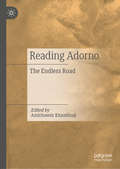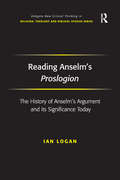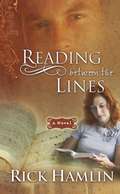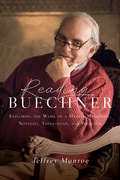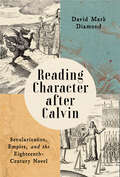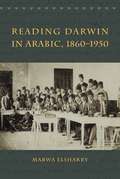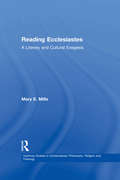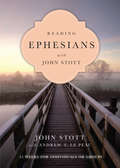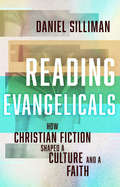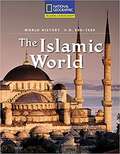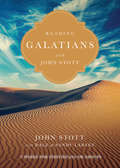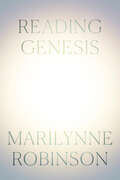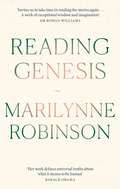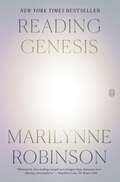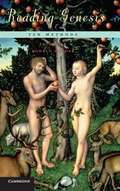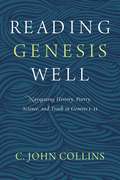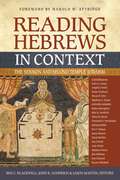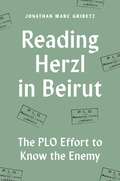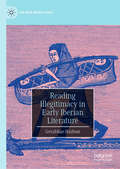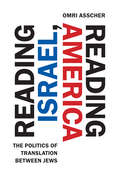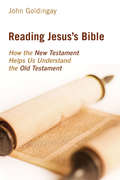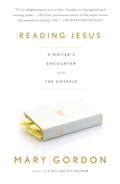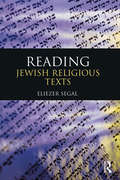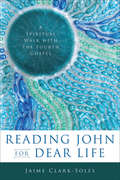- Table View
- List View
Reading Adorno: The Endless Road
by Amirhosein KhandizajiThis book draws on core concepts coined by Adorno, such as identity thinking, the culture industry, and his critique of the autonomous and rational subject, to address the ills that plague neoliberal capitalist societies today. These ills range from the risk of a return to totalitarian tendencies, to the global rise of the far-right, and anti-feminist conceptions of motherhood. Subsequent chapters outline the ways in which Adorno's thought can also be seen to redress the challenges of modern societies, such as the critical function of artworks, and the subversive potential of slow-food and popular music. The important underlying concern of the book is to highlight the continuing relevance of Adorno, both in dealing with the failures of neo-liberal capitalist societies, and in his applicability to a wide range of disciplines.
Reading Anselm's Proslogion: The History of Anselm's Argument and its Significance Today (Routledge New Critical Thinking in Religion, Theology and Biblical Studies)
by Ian LoganAnselm’s Proslogion has sparked controversy from the time it was written (c.1077) to the present day. Attempts to provide definitive accounts of its argument have led to a wide and contradictory variety of interpretations. In this book, Ian Logan goes back to basics, to the Latin text of the Proslogion with an original parallel English translation, before tracing the twists and turns of this controversy. Helping us to understand how the same argument came to be regarded as based on reason alone by some and on faith alone by others, as a logically sound demonstration by its supporters and as fatally flawed by its opponents, Logan considers what Anselm is setting out to do in the Proslogion, how his argument works, and whether it is successful.
Reading Between the Lines
by Rick HamlinSought after by every agent and actress in New York, handsome casting director James B. Lockhart Jr. is at the top of his craft. Red-haired beauty Elizabeth Ash lives in a third-floor apartment and earns her living as a flutist. Both have loved deeply...but things haven't turned out as they'd hoped. Then Elizabeth discovers a story scribbled in purple ink in the margins of some old novels at a nearby church thrift shop. It moves her like nothing else has...and makes her long for something more. Jim has spent months mired in the past. Now he hopes to start a new chapter in his life...create a new beginning. But is that really possible after all this time? Or is it too late?
Reading Buechner: Exploring the Work of a Master Memoirist, Novelist, Theologian, and Preacher
by Jeffrey MunroeFrederick Buechner is one of the most gifted writers of his generation, and his legacy casts a long shadow over Christian letters today.
Reading Character after Calvin: Secularization, Empire, and the Eighteenth-Century Novel
by David Mark DiamondHow Calvinist theology helps us read characters in the early British novel, shedding new light on the origins of modern secularism The strangeness of fictional characters in the eighteenth-century novel has been well documented. They are two-dimensional yet complex; they suggest unstable correspondences between the external and the internal. In Reading Character after Calvin, David Mark Diamond traces the religious genealogy of such figures, arguing that two-dimensionality reproduces through form a model of interpretation that originates in Calvinist Protestant theology. In Calvin&’s teachings, every person possessed a spiritual status as saved or damned, and their external features ostensibly reflected this inward condition. This belief, however, was always haunted by the possibility of a discrepancy between the two. Diamond shows how Calvinism survives in the pages of early novels as a guide to discerning religious hypocrisy and, eventually, distinctions related to imperial race-making. He tracks the migration of Calvinist character detection from its original, sectarian contexts to the worlds of eighteenth-century fiction, revealing the process by which religion came unbound from doctrinal orthodoxy and was grafted onto the ambition of racialized global dominion. Analyzing a diverse set of texts, Diamond offers a fresh account of both how literary character worked and how it works to naturalize, question, or critique the violence of empire.
Reading Darwin in Arabic, 1860-1950
by Marwa ElshakryIn "Reading Darwin in Arabic," Marwa Elshakry questions current ideas about Islam, science, and secularism by exploring the ways in which Darwin was read in Arabic from the late 1860s to the mid-twentieth century. Borrowing from translation and reading studies and weaving together the history of science with intellectual history, she explores DarwinOCOs global appeal from the perspective of several generations of Arabic readers and shows how DarwinOCOs writings helped alter the social and epistemological landscape of the Arab learned classes. aaaaaaaaaaaProviding a close textual, political, and institutional analysis of the tremendous interest in DarwinOCOs ideas and other works on evolution, Elshakry shows how, in an age of massive regional and international political upheaval, these readings were suffused with the anxieties of empire and civilizational decline. The politics of evolution infiltrated Arabic discussions of pedagogy, progress, and the very sense of history. They also led to a literary and conceptual transformation of notions of science and religion themselves. Darwin thus became a vehicle for discussing scriptural exegesis, the conditions of belief, and cosmological views more broadly. The book also acquaints readers with Muslim and Christian intellectuals, bureaucrats, and theologians, and concludes by exploring DarwinOCOs waning influence on public and intellectual life in the Arab world after World War I. "aaaaaaaaaaa ""Reading Darwin in Arabic "is an engaging and powerfully argued reconceptualization of the intellectual and political history of the Middle East. "
Reading Ecclesiastes: A Literary and Cultural Exegesis (Heythrop Studies in Contemporary Philosophy, Religion and Theology)
by Mary E. MillsReading Ecclesiastes explores the literary style and themes of the Book of Ecclesiastes, investigating its overall theological messages and the cultural perspectives which readers bring to bear on their act of reading. Examining the meaning found in Ecclesiastes through the use of two important contemporary reading methods - narrative criticism and cultural exegesis - Mary E. Mills breaks new ground. Highlighting the range of theological meaning attached to the book of Ecclesiastes as a result of treating the text as a form of narrative and a story told in the first person, this innovative book will appeal to all those interested in narrative criticism, literary studies and interpretation and Wisdom tradition and the ancient world more widely, as well as biblical scholars.
Reading Ephesians with John Stott: 11 Weeks For Individuals Or Groups (Reading The Bible With John Stott Ser.)
by John StottThe Message of Ephesians
Reading Evangelicals: How Christian Fiction Shaped a Culture and a Faith
by Daniel SillimanThe story of five best-selling novels beloved by evangelicals, the book industry they built, and the collective imagination they shaped Who are evangelicals? And what is evangelicalism? Those attempting to answer these questions usually speak in terms of political and theological stances. But those stances emerge from an evangelical world with its own institutions—institutions that shape imagination as much as they shape ideology. In this unique exploration of evangelical subculture, Daniel Silliman shows readers how Christian fiction, and the empire of Christian publishing and bookselling it helped build, is key to understanding the formation of evangelical identity. With a close look at five best-selling novels—Love Comes Softly, This Present Darkness, Left Behind, The Shunning, and The Shack—Silliman considers what it was in these books that held such appeal and what effect their widespread popularity had on the evangelical imagination. Reading Evangelicals ultimately makes the case that the worlds created in these novels reflected and shaped the world evangelicals saw themselves living in—one in which romantic love intertwines with divine love, humans play an active role in the cosmic contest between angels and demons, and the material world is infused with the literal workings of God and Satan. Silliman tells the story of how the Christian publishing industry marketed these ideas as much as they marketed books, and how, during the era of the Christian bookstore, this—every bit as much as politics or theology—became a locus of evangelical identity.
Reading Expeditions: The Islamic World (a. D. 600-1500) (World History)
by National Geographic LearningJourney to the Arabian Peninsula and see how Islam developed among the nomads and townspeople and later spread through conquest and trade. Learn about the teachings of Muhammad and the basic duties all Muslims must perform. Discover the great advances of Islamic civilization in science, art, and literature.
Reading Galatians with John Stott: 9 Weeks for Individuals or Groups (Reading the Bible with John Stott Series)
by John StottThe Message of Galatians
Reading Genesis
by Marilynne RobinsonOne of our greatest novelists and thinkers presents a radiant, thrilling interpretation of the book of Genesis.For generations, the book of Genesis has been treated by scholars as a collection of documents, by various hands, expressing different factional interests, with borrowings from other ancient literatures that mark the text as derivative. In other words, academic interpretation of Genesis has centered on the question of its basic coherency, just as fundamentalist interpretation has centered on the question of the appropriateness of reading it as literally true.Both of these approaches preclude an appreciation of its greatness as literature, its rich articulation and exploration of themes that resonate through the whole of Scripture. Marilynne Robinson&’s Reading Genesis is a powerful consideration of the profound meanings and promise of God&’s enduring covenant with man. This magisterial book radiates gratitude for the constancy and benevolence of God&’s abiding faith in Creation.
Reading Genesis
by Marilynne RobinsonA brilliant and dramatic close reading of the first book of the Bible focussing on the complex relationship with humankind'A work of exceptional wisdom and imagination' DR ROWAN WILLIAMS, DAILY TELEGRAPH'Rich and provoking... Robinson has masterfully traced a sense of wonder back to its ancient, remarkable source' JULIAN COMAN, OBSERVER'Reading Genesis is alive with questions of kindness, community and how to express what we so often struggle to put into words' NEW YORK TIMES MAGAZINEFor generations, the Book of Genesis, included in its entirety here, has been treated by scholars as a collection of documents by various hands, expressing different factional interests, with borrowings from other ancient literatures that mark the text as derivative. In other words, academic interpretation of Genesis has centered on the question of its basic coherence, just as fundamentalist interpretation has centered on the question of the appropriateness of reading it as literally true.Marilynne Robinson's approach is different. Hers is one of an appreciation of Genesis for its greatness as literature, for its rich articulation and exploration of themes that resonate through the whole of Scripture. She illuminates the importance of the stories of, among others, Adam and Eve; Noah and his ark; the rivalry of Cain and Able; and the father and son drama of Abraham and Isaac, to consider the profound meanings and promise of God's enduring covenant with humankind. Her magisterial book radiates gratitude for the constancy and benevolence of God's abiding faith in Creation.
Reading Genesis
by Marilynne RobinsonINSTANT NEW YORK TIMES BESTSELLEROne of our greatest novelists and thinkers presents a radiant, thrilling interpretation of the book of Genesis.For generations, the book of Genesis has been treated by scholars as a collection of documents by various hands, expressing different factional interests, with borrowings from other ancient literatures that mark the text as derivative. In other words, academic interpretation of Genesis has centered on the question of its basic coherency, just as fundamentalist interpretation has centered on the question of the appropriateness of reading it as literally true.Both of these approaches preclude an appreciation of its greatness as literature, its rich articulation and exploration of themes that resonate through the whole of Scripture. Marilynne Robinson’s Reading Genesis, which includes the full text of the King James Version of the book, is a powerful consideration of the profound meanings and promise of God’s enduring covenant with humanity. This magisterial book radiates gratitude for the constancy and benevolence of God’s abiding faith in Creation.
Reading Genesis
by Ronald HendelReading Genesis presents a panoramic view of the most vital ways that Genesis is approached in modern scholarship. Essays by ten eminent scholars cover the perspectives of literature, gender, memory, sources, theology, and the reception of Genesis in Judaism and Christianity. Each contribution addresses the history and rationale of the method, insightfully explores particular texts of Genesis, and deepens the interpretive gain of the method in question. These ways of reading Genesis, which include its classic past readings, map out a pluralistic model for understanding Genesis in - and for - the modern age.
Reading Genesis Well: Navigating History, Poetry, Science, and Truth in Genesis 1-11
by C. John CollinsWhat does it mean to be a good reader of Genesis 1-11? What does it mean to take these ancient stories seriously and how does that relate to taking them literally? Can we even take any of this material seriously?Reading Genesis Well answers these questions and more, promoting a responsible conversation about how science and biblical faith relate by developing a rigorous approach to interpreting the Bible, especially those texts that come into play in science and faith discussions. This unique approach connects the ancient writings of Genesis 1-11 with modern science in an honest and informed way.Old Testament scholar C. John Collins appropriates literary and linguistic insights from C. S. Lewis and builds on them using ideas from modern linguistics, such as lexical semantics, discourse analysis, and sociolinguistics. This study helps readers to evaluate to what extent it is proper to say that the Bible writers held a "primitive" picture of the world, and what function their portrayal of the world and its contents had in shaping the community.
Reading Hebrews in Context: The Sermon and Second Temple Judaism
by ZondervanStudy Hebrews in its Second Temple ContextFollowing the proven model established in Reading Romans in Context, Reading Mark in Context, and Reading Revelation in Context, this book brings together a series of accessible essays that compare and contrast the theology and hermeneutical practices of the book of Hebrews with various early Jewish literature.Going beyond an introduction that merely surveys historical events and theological themes, this textbook examines individual passages in Second Temple Jewish literature in order to illuminate the ideas and emphases of Hebrews' varied discourses. Following the rhetorical progression of Hebrews, each chapter in this textbook:pairs a major unit of Hebrews with one or more sections of a thematically related Jewish textintroduces and explores the historical and theological nuances of the comparative textshows how the ideas in the comparative text illuminate those expressed in HebrewsIn addition to the focused comparison provided in the essays, Reading Hebrews in Context offers other student-friendly features that help them engage broader discussions, including an introductory chapter that familiarizes students with the world and texts of Second Temple Judaism and a glossary of important terms. The end of each chapter contains a list of other thematically-relevant Second Temple Jewish texts recommended for further study and a focused bibliography pointing students to critical editions and higher-level discussions in scholarly literature they might use to undertake their own comparative studies.
Reading Herzl in Beirut: The PLO Effort to Know the Enemy
by Jonathan Marc GribetzHow the Palestine Liberation Organization Research Center informed the PLO&’s relationship to Zionism and IsraelIn September 1982, the Israeli military invaded West Beirut and Israel-allied Lebanese militiamen massacred Palestinians in the Sabra and Shatila refugee camps. Meanwhile, Israeli forces also raided the Palestine Liberation Organization Research Center and trucked its complete library to Israel. Palestinian activists and supporters protested loudly to international organizations and the Western press, claiming that the assault on the Center proved that the Israelis sought to destroy not merely Palestinian militants but Palestinian culture as well. The protests succeeded: in November 1983, Israel returned the library as part of a prisoner exchange. What was in that library?Much of the expansive collection the PLO amassed consisted of books about Judaism, Zionism, and Israel. In Reading Herzl in Beirut, Jonathan Marc Gribetz tells the story of the PLO Research Center from its establishment in 1965 until its ultimate expulsion from Lebanon in 1983. Gribetz explores why the PLO invested in research about the Jews, what its researchers learned about Judaism and Zionism, and how the knowledge they acquired informed the PLO&’s relationship to Israel.
Reading Illegitimacy in Early Iberian Literature (The New Middle Ages)
by Geraldine HazbunReading Illegitimacy in Early Iberian Literature presents illegitimacy as a fluid, creative, and negotiable concept in early literature which challenges society’s definition of what is acceptable. Through the medieval epic poems Cantar de Mio Cid and Mocedades de Rodrigo, the ballad tradition, Cervantes’s Novelas ejemplares, and Lope de Vega’s theatre, Geraldine Hazbun demonstrates that illegitimacy and legitimacy are interconnected and flexible categories defined in relation to marriage, sex, bodies, ethnicity, religion, lineage, and legacy. Both categories are subject to the uncertainties and freedoms of language and fiction and frequently constructed around axes of quantity and completeness. These literary texts, covering a range of illegitimate figures, some with an historical basis, demonstrate that truth, propriety, and standards of behaviour are not forged in the law code or the pulpit but in literature’s fluid system of producing meaning.
Reading Israel, Reading America: The Politics of Translation between Jews (Stanford Studies in Jewish History and Culture)
by Omri AsscherAmerican and Israeli Jews have historically clashed over the contours of Jewish identity, and their experience of modern Jewish life has been radically different. As Philip Roth put it, they are the "heirs jointly of a drastically bifurcated legacy." But what happens when the encounter between American and Israeli Jewishness takes place in literary form—when Jewish American novels make aliyah, or when Israeli novels are imported for consumption by the diaspora? Reading Israel, Reading America explores the politics of translation as it shapes the understandings and misunderstandings of Israeli literature in the United States and American Jewish literature in Israel. Engaging in close readings of translations of iconic novels by the likes of Philip Roth, Saul Bellow, Bernard Malamud, Amos Oz, A. B. Yehoshua, and Yoram Kaniuk—in particular, the ideologically motivated omissions and additions in the translations, and the works' reception by reviewers and public intellectuals—Asscher decodes the literary encounter between Israeli and American Jews. These discrepancies demarcate an ongoing cultural dialogue around representations of violence, ethics, Zionism, diaspora, and the boundaries between Jews and non-Jews. Navigating the disputes between these "rival siblings" of the Jewish world, Asscher provocatively untangles the cultural relations between Israeli and American Jews.
Reading Jesus's Bible: How the New Testament Helps Us Understand the Old Testament
by John GoldingayFor Jesus and his contemporaries, what we now know as the Old Testament was simply the Scriptures—and it was the fundamental basis of how people understood their relationship with God. In this book John Goldingay uncovers five major ways in which the New Testament uses the Old Testament. His discussion paves the way for contemporary readers to understand and appreciate the Old Testament more fully. Along with an overview of how Jesus and the first Christian writers read the Old Testament, illustrated with passages from Matthew, Romans, 1 Corinthians, and Hebrews, Goldingay offers a straightforward introduction to the Old Testament in its own right. Reading Jesus's Bible will shed fresh Old Testament light on Jesus, God, and the church for readers today.
Reading Jesus's Bible: How the New Testament Helps Us Understand the Old Testament
by John GoldingayFor Jesus and his contemporaries, what we now know as the Old Testament was simply the Scriptures—and it was the fundamental basis of how people understood their relationship with God. In this book John Goldingay uncovers five major ways in which the New Testament uses the Old Testament. His discussion paves the way for contemporary readers to understand and appreciate the Old Testament more fully. Along with an overview of how Jesus and the first Christian writers read the Old Testament, illustrated with passages from Matthew, Romans, 1 Corinthians, and Hebrews, Goldingay offers a straightforward introduction to the Old Testament in its own right. Reading Jesus's Bible will shed fresh Old Testament light on Jesus, God, and the church for readers today.
Reading Jesus: A Writer's Encounter with the Gospels
by Mary GordonReading Jesus is a personal journey through the fundamental Biblical stories. As celebrated author Mary Gordon ponders the intense strangeness of a deity in human form, unresolved moral ambiguities within the text, and the problem posed to her as an enlightened reader by the miracle of the Resurrection. What she rediscovers--and reinterprets with her signature candor, intelligence, and straightforwardness--is a rich store of overlapping, sometimes conflicting teachings that feel both familiar and tantalizingly elusive.
Reading Jewish Religious Texts (Reading Religious Texts)
by Eliezer SegalReading Jewish Religious Texts introduces students to a range of significant post-biblical Jewish writing. It covers diverse genres such as prayer and liturgical poetry, biblical interpretation, religious law, philosophy, mysticism and works of ethical instruction. Each text is newly translated into English and accompanied by a detailed explanation to help clarify the concepts and arguments. The commentary also situates the work within its broader historical and ideological context, giving readers an enhanced appreciation of its place in the Jewish religious experience. This volume includes a comprehensive timeline, glossary and bibliography.
Reading John for Dear Life: A Spiritual Walk With The Fourth Gospel
by Jaime Clark-SolesJaime Clark-Soles takes readers on a dynamic journey deep into the heart of John in this lively reading of the Fourth Gospel. This book is not simply a commentary but a spiritual companion to be read alongside the Bible. Clark-Soles provides important historical and literary insights while illuminating the dramatic characters in John and emphasizing the Gospel's unique themes and symbols. Her engaging writing style will generate enthusiasm and investment in John's message. Readers will also appreciate the addition of prayers as well as questions for individual study and/or group discussion. This excellent guide will enrich our spiritual journeys while opening ourselves up to Jesus through the words, stories, questions, symbols, and characters we encounter in John's Gospel.
